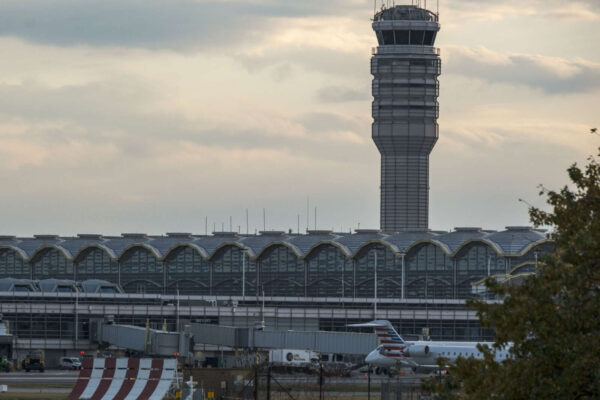
A group formed to address noise issues associated with National Airport says allowing more and longer flights is a bad idea.
A bill introduced last week in Congress would “allow 28 more flights daily and permit airlines to offer more long-distance service out of National Airport, where federal rules allow only a handful of flights to operate beyond a 1,250-mile perimeter,” the Washington Post reported.
A subsequent (unscientific) ARLnow poll found that just over 50% of respondents “definitely” support the bill, while another 15% support it with reservations. But the DCA Community Noise Working Group said Tuesday in a letter to the Senate Committee on Commerce, Science & Transportation that it “strongly objects to any changes to the DCA perimeter rule.”
“DCA was designed as a regional airport and is situated in the middle of densely populated and noise-sensitive residential areas,” the group wrote. “While expanding the perimeter to permit non-stop flights to cities such as San Antonio or El Paso may benefit a limited few in terms of convenience, many thousands more D.C. area residents would suffer the negative impacts of those flights.”
A spokesperson for Rep. Don Beyer (D-Va.) tells ARLnow that local lawmakers have expressed objections to the bill.
The bill “would dangerously overload DCA’s operational capacity and the very significant noise impact on the area,” said Aaron Fritschner, Beyer’s Deputy Chief of Staff.
“There’s a reason this bill is getting pushed by people who represent Delta [Air Lines] hubs over the objections of people who actually work with [the Metropolitan Washington Airports Authority] and the local community to strike the balance for the different things people want from DC’s airport system,” he added.
Arlington, D.C., Montgomery County (Md.) and Alexandria residents, especially those who live along flight paths near the Potomac, have long engaged in a tug of war over aircraft noise associated with National Airport. The complaints have led to noise studies, tweaks in flight paths, and — last year — a provision in a law, inserted by Beyer, that calls for NASA to accelerate work on quieter and more climate-friendly aviation technology.
The full letter from the Community Noise Working Group is below.
Dear Chair Cantwell and Ranking Member Cruz:
Members of the Ronald Reagan Washington National Airport (DCA) Community Noise Working Group are writing to express our strong objection to attempts by members of Congress to further legislatively alter the perimeter rule at DCA.
The DCA Community Working Group was formed in 2015 due to serious concerns by residents across the metropolitan Washington, D.C. area about aircraft noise. The problem of aviation noise from DCA is a significant public health and environmental concern to hundreds of thousands of residents in our area. The DCA Community Working Group has spent the last seven years working with the airport authority and the FAA to try to address this complicated and untenable situation. Further expansion or exceptions to the perimeter rule would be a set-back for our efforts and for the residents we represent.
As you know, DCA was designed as a regional airport and is situated in the middle of densely populated and noise-sensitive residential areas. For this reason, the flight perimeter at DCA was originally limited to 650 miles. Later, it was expanded by Congress to 1,250 miles. Through a confluence of events, including:
- 32 congressionally mandated exceptions to the perimeter rule,
- federal laws limiting local control of airports,
- use of DCA as a hub airport, and
- satellite-based navigation which concentrated flights and noise over residential areas,
aviation noise and emissions has become a significant problem for residents in the Washington metropolitan area. Analysis by the Government Accountability Office with further considerations against expanding the perimeter at DCA can be reviewed here: https://www.gao.gov/assets/gao-21-176.pdf
Due to DCA’s location, arriving and departing flights impact areas where people live and work, and where children attend school. Long-haul flights use larger aircraft on average, and larger aircraft require more fuel. All that extra weight requires more thrust which makes them louder. Long-haul jets also frequently take off very early in the morning and land late at night because they are departing to or arriving from airports located farther away. This means the noise that they create is some of the most detrimental to our communities.
Residents under the DCA flight paths already suffer the ill-effects of some 800 commercial aircraft arriving and departing each day, often contending with an airplane overhead every 2 minutes. Expanding the perimeter rule to include even more impactful, long-haul flights would further degrade the quality of life for thousands of residents.
While expanding the perimeter to permit non-stop flights to cities such as San Antonio or El Paso may benefit a limited few in terms of convenience, many thousands more D.C. area residents would suffer the negative impacts of those flights. For example, a typical aircraft used at DCA for long-haul flights is the Boeing 737 which seats about 170 passengers. There are easily 40,000 to 50,000 people living under any given flight path within 10-15 nautical miles north or south of DCA. Therefore, each time a few hundred people enjoy the convenience of flying beyond the 1,250 mile perimeter, there are 200 to 300 times more people on the ground who suffer the consequences.
Meanwhile, nearby Dulles International Airport (IAD) was built and zoned specifically to accommodate larger, long-haul flights and operates under capacity. The new Metro Silver Line station at IAD makes Dulles a more convenient option for passengers than ever. It makes much more sense to continue operating long-haul flights out of IAD, and keep them out of the skies over the densely populated areas of Washington, D.C., Maryland and Virginia where they cause environmental harm and human misery.
For the reasons stated above, the DCA Community Noise Working Group strongly objects to any changes to the DCA perimeter rule.
Sincerely,
Members of the DCA Community Noise Working Group

